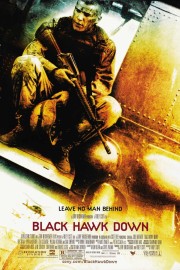Black Hawk Down
More than any other film of the past decade, Ridley Scott’s “Black Hawk Down” gets down to the nitty-gritty of the disconnect between Washington political strategy and the reality of the ground, and Washington isn’t even shown. In this film you can see the groundwork for later films like “The Kingdom,” “Jarhead,” and “The Hurt Locker.” One quote, early on in the film, before the real shit goes down, encompasses the film rigorously:
“You wanna know what I think? It doesn’t matter what I think.”
Welcome to war. But as we’ve seen in films as diverse as “Saving Private Ryan,” “Platoon,” and “Courage Under Fire,” any good soldier knows that it’s the mission that matters. But as the Rangers in “Black Hawk Down” will find out, sometimes the mission they’re sent to do becomes less important than getting their brothers in arms out when the shit hits the fan. After all, the next more important quote for a soldier to know is this- “Leave no man behind.”
That’s what happened in October 1993, when Rangers were sent into Mogadishu to extract lieutenants of a Somali warlord who was starving the people when UN help was being dropped in, and ended up in a fight for their lives when two black hawk helicopters were downed by rebel gunfire, and others in the convoy are spread out around the city, some trying to get the wounded out, some trying to set up perimeters at the crash sites, and some to get there. Watching all of it from base is Maj. Gen. William F. Garrison (Sam Shepard), who is forced to stand by while his men are battling a city.
A lot of great actors populate this film- Ewan McGregor, Tom Sizemore, Josh Hartnett (in his best performance), Eric Bana, Orlando Bloom, Ewan Bremner, Jason Issacs, and William Fichtner (among others)- but the real star is its’ director, who uses all the weapons in his creative arsenal to make sense out of the chaos. Working from Ken Nolan’s screenplay- based on the book by Mark Bowman- Scott sees the situation from all angles- on the ground, from the air, from base- and makes it possible for us to understand what’s happening, where everyone is, and what the stakes are. From his extraordinary cinematographer Slawomir Idziak to his Oscar-winning editor Pietro Scalia to composer Hans Zimmer (whose score blends contemporary sounds with more classical militaristic hymns), Scott and co. are at the peak of the powers in not just staging the action but also giving us a sense of the resolve of these soldiers to get the job done, even if that job becomes saving the person next to you. Correction- especially if that job becomes saving the person next to you.
This is the type of scenario that video games are based off of- a handful of soldiers against a never-ending stream of enemy fire- but Scott makes it resonate with real force and energy, and he’s helped by a cast that believes their characters to the core. He also doesn’t bog the film down with politics, which is impressive considering how emblematic this scenario has become in political circles of our current difficulties in the Middle East. This film is about this story, how it went down, and although context is provided in title cards before and after the film, it’s strongest quality is how clearly Scott sees the story, and pays tribute not only to the 19 soldiers who died and the 70 that were wounded, but the ones that lived, and kept fighting even though they had every reason not to. That alone makes any soldier a hero in my book.










